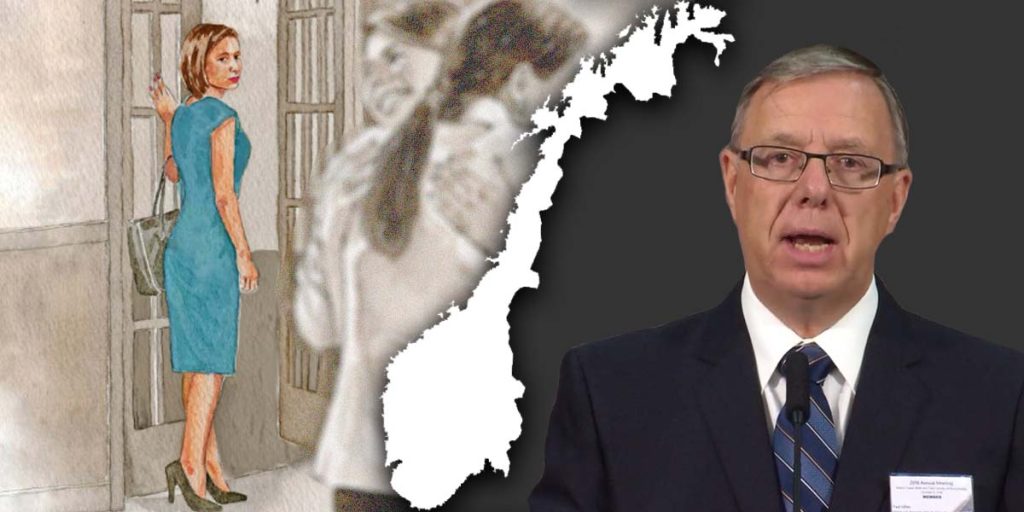More than 11 years revealing secrets because there is no excuse for secrecy in religion – w1997 June 1; Dan 2:47; Matt 10:26; Mark 4:22; Luke 12:2; Acts 4:19, 20.

On 1 January 2021, the new Religious Communities Act came into force in Norway. The Act contains conditions for registration of and grants to faiths and religious communities. It also specifies several grounds for when grants can be refused. With the implementation of this new law, Jehovah’s Witnesses have been refused state subsidies for 2021. This decision has been formally upheld on September 30, 2022.
Over the years, the question of whether Jehovah’s Witnesses can be deprived of state support as a result of the group’s shunning practice has been raised several times. In 1999, the practice was assessed and it was concluded that there was no basis for refusing grants. This conclusion has been upheld on several occasions until the new Act came into force. In Jehovah’s Witnesses’ complaint of the decision, they referred to this very fact, stating that in 1999, 2012, and as recently as 2019, the State Administrator concluded that the shunning practice did not provide a basis for refusing the grants or deprive them of registration.
Jehovah’s Witnesses maintain that becoming a member of Jehovah’s Witnesses (through baptism) is a voluntary and conscious decision. The children make their own conscious choices when they have reached the level of maturity necessary to make such a decision. In practice, this happens in most cases when the minor is in his mid or late teens. Jehovah’s Witnesses state that the hypothetical conditions on which the State Administrator bases its decision therefore apply to mature minors between 15 and 18 years of age. Jehovah’s Witnesses also draw parallels to other forms of expulsion, such as from school, football teams, scout groups and martial arts clubs.
Furthermore, Jehovah’s Witnesses state that unbaptized minors who attend church meetings and participate in Jehovah’s Witnesses’ religious activities with their parents who are Jehovah’s Witnesses are not disfellowshipped if they do not follow the moral standards of the Bible.
Here we list some of the key points of the State Administrator’s response to Jehovah’s Witnesses complaint and why it has upheld their decision to refuse the grant to Jehovah’s Witnesses.
The State Administrator points out that Jehovah’s Witnesses are clear that members should not have contact with excluded members and members who have withdrawn from the religious community. The state administrator assumes that this practice can lead to members feeling pressured to remain in the religious community. The practice is thus considered to be an obstacle to the members’ right to express themselves freely, and in violation of the Religious Communities Act.
Referring to Organized to do Jehovah’s Will (pages 153-155), the State Administrator points out that the Jehovah’s Witnesses encourages its members to avoid contact with de-registered persons; and that children are socially isolated from the congregation, as a reaction to a child’s behaviour. It says that this treatment is to “be regarded as negative social control on the part of the religious community and that the treatment infringes on the child’s rights”.
Pointing to Chapter 12.17 of the elder textbook, Shepherd the Flock of God, the State Administrator maintains that members who defy the call to avoid de-registered persons can have consequences for the remaining members, “and thus the religious community’s claims that it is only the members themselves who decide who they want to have contact with are not true.” In reality, Jehovah’s Witnesses have a ban on contact with former members.
The first paragraph of Section 6 of the Religious Communities Act states, ““If a faith or religious community, or individuals acting on behalf of the community, use violence or coercion, make threats, violate children’s rights, violate statutory prohibitions on discrimination or in other ways seriously violate the rights and freedoms of others, the community may be denied a grant or grants may be shortened. Grants can also be refused or cut short if a community encourages or provides support for violations mentioned in this section.”
In the first paragraph of Section 11 of the Religious Communities Act, in explaining the reason(s) for the denial of state funding, it clarifies, “particular emphasis must be placed on measures the community has put in place to prevent such conditions. Emphasis must also be placed on how serious the relationship is and whether it appears intentional.”
The right to refuse grants in light of human rights should be reserved for cases where, after a concrete assessment, the awarding of grants will appear unreasonable. Broadly speaking, it is about safeguarding the public’s trust that the community’s resources are used in an efficient way to achieve socially beneficial purposes. The State, after all, is bound by human rights as described in the Norwegian Constitution and through the Human Rights Act. The state has a duty to both respect and secure human rights.
The State Administrator makes it clear that state funding falls outside the scope of the European Convention on Human Rights (ECHR), Articles 9 and 11. Neither Article entitle religions to state subsidies. Quoting from the European Court of Human Rights, it says, “The freedom to manifest one’s religion or beliefs under this Article [9] does not confer on the applicant association or its members and entitlement to secure additional funding from the State budget.
Jehovah’s Witnesses claimed that no statistics are kept on the age of baptized young people in Jehovah’s Witnesses. However, they could not say with certainty that pre-teens are not baptized.
It must be noted that the State Administrator based its decision mainly on information relating to shunning from the Jehovah’s Witnesses’ own publications. The information indicates that shunning involves a form of strict, systematic and targeted social exclusion, which the State Administrator finds to be a form of negative social control and psychological violence.
The State Administrator believes it unreasonable to wait for several violations of the Religious Communities Act to have occurred before taking action when Jehovah’s Witnesses’ practice and documents clearly point to such violations of the Act. In its assessment, emphasis is placed on how serious the violation is and whether it appears to be intentional. If the violation appears to be systematic, persistent or intentional, the grant must be refused in full. The violation was found to be systematic, persistent and intentional.
The criteria in the Religious Communities Act are objectively designed, where the purpose is to protect rights, not to affect specific religious groups or faiths. The State Administrator points out that the best interests of the child must be a fundamental consideration in all actions taken by the state that affect children. Jehovah’s Witnesses’ shunning practice applies to baptized children, and to baptized children who leave the group. Therefore, the protection of children’s rights must be given decisive weight in a balancing of rights.
This decision from the Norwegian government is extremely important to those concerned by the coercive control and violence committed by Jehovah’s Witnesses around the world. Shunning of former members isn’t isolated to Norway. It is committed in every single country in which Jehovah’s Witnesses practice their religious beliefs freely.
If you would like to see an end to religiously mandated shunning, you can contact the government in your own country. All you need to do is write a short letter explaining how shunning has affected you and your family. Attach a copy of the original letter in Norwegian and the copy translated in English and briefly mention that you are concerned that religiously motivated psychological violence is not only tolerated but is funded by the government through tax breaks and incentives, and you would like to see an end of such subsidies until this religious group ceases from infringing on your rights, and the rights of many others who are former members of this group.
Who do you need to contact? Your first point of contact should be the minister responsible for children and family affairs. In the UK, for example, this is the Minister for Schools and Childhood. In the Republic of Ireland, this is the Minister for Community Development and Charities.
If you think that your voice doesn’t matter because maybe someone else will write to your government, it is important to realise that the more voices, the more we are heard. Please do your part to write to your government. If you are unsure who to write to, write to your local representative and ask if s/he can forward your letter to the appropriate governmental department.
January 1, 2021
The new edition of the Religious Communities Act came into force.
February 26, 2021
Jehovah’s Witnesses make a claim for state subsidies for 12, 727 members.
March 15, 2021
The Ministry of Children & Families receives an enquiry from a former Jehovah’s Witness who explained the religious community’s shunning practice.
April 15, 2021
The Ministry of Children & Families forwards the inquiry to the State Administrator asking whether the information provided a basis for conducting further investigations.
May 27, 2021
The State Administrator contacts Jehovah’s Witnesses for an explanation.
June 23, 2021
Jehovah’s Witnesses respond to the request from the State Administrator.
September 15, 2021
The State Administrator contacts Jehovah’s Witnesses again referring to further enquiries and informs the religious group that the information in the inquiries could have an impact on the processing their claim for state subsidies, and asked for comments within 3 weeks.
October 4, 2021
Jehovah’s Witnesses ask for further clarification on the basis of the investigation and possible refusal of grants.
October 25, 2021
The State Administrator responds to the inquiry from Jehovah’s Witnesses.
November 19, 2021
The State Administrator receives a statement from Jehovah’s Witnesses.
January 27, 2022
The State Administrator decides to refuse state subsidies to Jehovah’s Witnesses.
February 17, 2022
Jehovah’s Witnesses appeal the decision.
March 31, 2022
The Ministry of Children & Families receive the Jehovah’s Witnesses’ complaint.
September 30, 2022
The Ministry of Children & Families uphold the State Administrator’s decision to refuse state subsidies for 2021.

Jason Wynne is a husband to one wife, father to two children, and writes extensively on the activities of Jehovah's Witnesses having been baptized as a member in 1995.